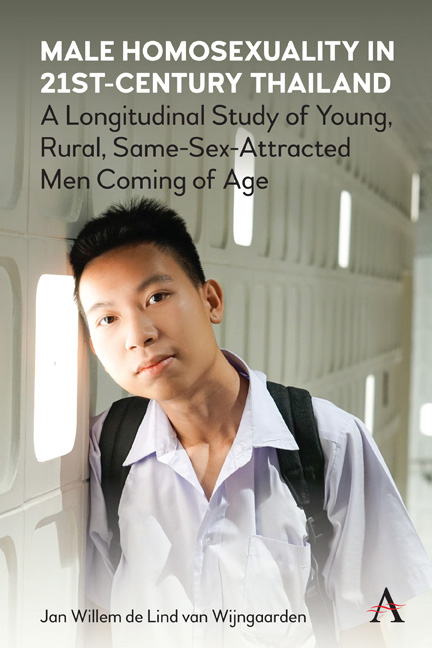 Male Homosexuality in 21st-Century Thailand
Male Homosexuality in 21st-Century Thailand Book contents
- Frontmatter
- Dedication
- Contents
- Preface
- 1 Introduction
- 2 Introducing the Research Participants
- 3 Understanding Thai Personhood
- 4 Homosexuality: A Matter of Karma?
- 5 In the Beginning … Exploring Early Awareness of Being Different
- 6 The Important Role of Gender in Understanding Homosexuality in Thailand
- 7 ‘All in the Family’: Tactics for Living and Growing Up in a Heteronormative World
- 8 How Dating Friends Plays a Role in Destabilizing Gender-Based Notions of Homosexuality
- 9 The Role of the Internet in Learning about and Experimenting with New Sexual Identities
- 10 ‘No Money, No Honey’: Love and Sex in Pursuit of a Better Life
- 11 Conclusions and Implications for HIV Service Provision and Sexuality Education
- Appendix: Glossary of Thai Terms Used in this Book
- References
- Index
3 - Understanding Thai Personhood
Published online by Cambridge University Press: 23 March 2021
- Frontmatter
- Dedication
- Contents
- Preface
- 1 Introduction
- 2 Introducing the Research Participants
- 3 Understanding Thai Personhood
- 4 Homosexuality: A Matter of Karma?
- 5 In the Beginning … Exploring Early Awareness of Being Different
- 6 The Important Role of Gender in Understanding Homosexuality in Thailand
- 7 ‘All in the Family’: Tactics for Living and Growing Up in a Heteronormative World
- 8 How Dating Friends Plays a Role in Destabilizing Gender-Based Notions of Homosexuality
- 9 The Role of the Internet in Learning about and Experimenting with New Sexual Identities
- 10 ‘No Money, No Honey’: Love and Sex in Pursuit of a Better Life
- 11 Conclusions and Implications for HIV Service Provision and Sexuality Education
- Appendix: Glossary of Thai Terms Used in this Book
- References
- Index
Summary
Introduction
This chapter is meant as an introduction to the presentation of the findings of the study, and focuses on theories and ideas about what it means to be Thai. The focus is on how specific characteristics of Thai personhood affect the study of gender and sexuality.
Is Thai Society ‘Loosely Structured’ or Rigid and Hierarchical?
Foreigners who come to Thailand for the first time often wonder about the country. People seem different: the most clichéd observation is that Thais ‘always smile’. Communication is often difficult as Thailand's terrible education system produces people who generally do not understand phrases such as ‘What is your name?’ despite having undergone more than 12 years of English-language education. The issue of how Thai society and identity ‘work’ has been at the fore of what has come to be called Thai studies since the 1950s and 1960s. John Embree (1950, 187) was struck by what he called the ‘individualistic behaviour’ of Thai people, and noted an ‘almost determined lack of regularity, discipline, and regimentation in Thai life’. Embree concluded that Thai society was ‘loosely structured’ compared to what he called ‘rigid societies’ such as China, Japan and Vietnam. Embree credited the loose structure of Thai society with enabling the Thai to deal with change more flexibly and with fewer shocks to society than more rigid societies could endure.
Another American scholar, Lucien Hanks (1962), conducted studies on what he called the ‘Thai moral order’ by describing how the Buddhist principle of merit influences Thai personality. Thai people believe in reincarnation, with one's rebirth based on the balance of accumulated good and bad karma at the end of one's life determining the socio-economic position or form in which one is reborn. A second important aspect of Thai personality Hanks described was power, which provides for (in)stability and (in)security in the world, based on feeble alliances – this leads Thai people to rely strongly on their family and/or clan and to distrust outsiders. Hanks therefore disagreed with Embree: he did not see any ‘looseness’ in Thai society but came to the opposite conclusion, which was that Thai society is rigidly organized in a strongly hierarchical manner.
- Type
- Chapter
- Information
- Male Homosexuality in 21st-Century ThailandA Longitudinal Study of Young, Rural, Same-Sex-Attracted Men Coming of Age, pp. 19 - 32Publisher: Anthem PressPrint publication year: 2021
